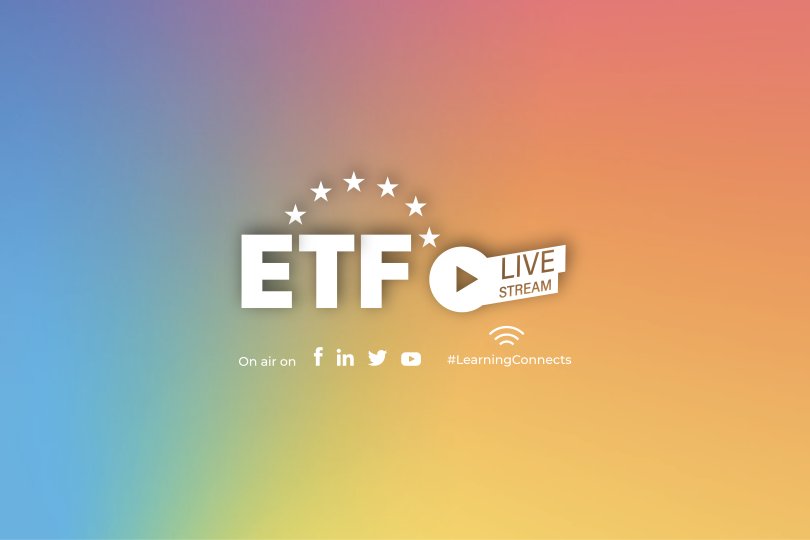
Teaching excellence
How teachers of skills can ‘excel together’
The European Training Foundation’s communications ‘Learning Connects’campaign took a novel turn Wednesday February 16, when three speakers who had all spontaneously responded to a call to participate in the weekly ‘Learning Connects’ live-streamed conversations contributed their best stories of excellence in the field of learning.
The conversation – between Evelien Verschroeven, Founder of Innovation OIC [Observation, Imagination & Connection], and teacher at the University of Applied Science, Belgium; Bojan Milovanovic, Assistant Professor at the Faculty of Civil Engineering, University of Zagreb, Croatia; and Svetlana Belic Malinic, Academic Director at the Institute for Contemporary Education, Serbia – was part of the ETF’s February communication theme, “Let’s excel together.”
Hosted by ETF communications officer, Daria Santucci, the livestream kicked off with Evelien’s observations on her experience of teaching at Belgium’s University of Applied Sciences – focusing on teaching entrepreneurship skills to electromechanics students.
“I come from a family of engineers and, perhaps, I am a little unusual in that I have my own teaching methods, have long used technology in my teaching and feel it is important to open the eyes of students and let them try, or entrepreneurship, because there a lot of soft skills we shall all need in the future,” she said.
Evelien aims to ensure her students develop “two or three entrepreneurial competencies” while studying. This builds the foundations of trust in entrepreneurship – planting seeds that may mature later, she suggests.
She draws upon the existing life experience of her mostly male students – the majority of whom comes from families working the land in the largely rural, agricultural region where her university is situated. By working with lived experience she then aims to create “virtual enterprises” in the classroom to give students the taste of being their own bosses.
Zagreb University professor Bojan Milovanovic focuses on energy efficiency. His approach to excellence in teaching and implementing new ways of learning is to move from experiments to working on real projects.
“My students have become fed up with all theory, theory, theory and from the feedback I get from my students, they feel that now finally they are getting some practical experience in my course,” Bojan said. “I like to give them real experience, as if they are real designers in the construction sector.” Is a method he describes as “throwing them into the water – and they have to swim.”
It may be, he concedes, “difficult and scary at first” for the students, but by the end of the semester the feedback he gets is that the energy efficiency/climate resilience in construction course is seen as a “really refreshing way to teach a university course.”
Bojan is also introducing digital approaches – building information modelling, for example, to “make them future-ready.”
As Academic Director at the Institute for Contemporary Education, Serbia, Svetlana Belic Malinic oversees a college that is entirely devoted to professional development of teachers. She detailed how training teachers in excellence was coordinated at the school – which is organised around eight centres.
Focusing on two of the centres – the centre for teacher professional development, and the Cambridge International Centre for the professional development of qualifications for teachers – she explains:
“We focus both nationally and international, and support teachers on their journey of improvement in professional development.” The pandemic had driven one particular new approach to “hybrid teacher training” involving parents, teachers and students, she said.
The innovative approach works on three approaches:
- a focus on academic skills (such as the value of learning lifelong learning project solving
- Digital competencies, including digital literacy, research and analysis
- and social-emotional competencies, including empathy, ethical awareness, life skills, character development and collective solidarity.
“I am not saying that people did not have these competencies earlier, but the new environment [of the pandemic, distance learning etc.,] was totally new and quite stressful for all three groups,” Svetlana said. “It called for actions and reactions to help them develop social and emotional competencies in a different environment.”
Demonstrating just how cutting edge – although in some ways entirely in keeping with the emerging new post-pandemic zeitgeist – Svetlana highlighted one online workshop of which she is particularly proud. “A colleague ran mindfulness sessions online. This was difficult for many reasons – it is difficult to communicate with parents, teachers and students on the other side of a screen sometimes they don’t want to be seen, they turn off their cameras and microphones.”
But her colleague persevered as “mindfulness was all about creating a rapport with the three groups.”
It was, Svetlana notes, “a difficult period for all, but we are very proud of the fact that we facilitated and somehow helped all our parents, teacher and students to overcome problems, maintain their mental health and become more resilient in these times.”
It was, she concluded, “all about lifelong competencies and acquiring the new skills we need in these times.”
Did you like this article? If you would like to be notified when new content like this is published, subscribe to receive our email alerts.